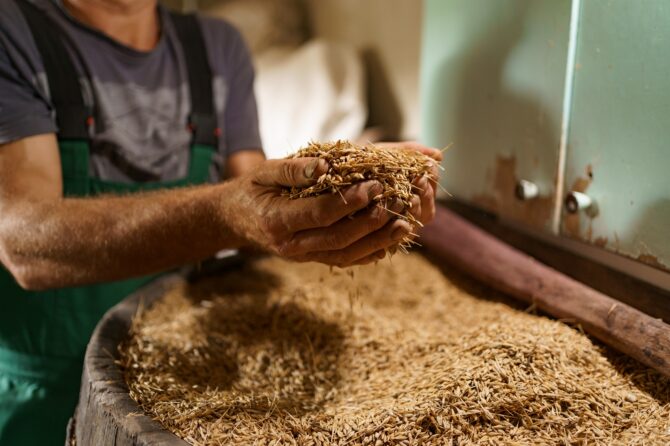
Oats and Prostate Health
Oats (Avena sativa) have long been valued as a staple whole grain with substantial health benefits, ranging from cardiovascular protection to metabolic support. Recent nutritional research has also turned attention to oats in the context of men’s health, particularly prostate health and urinary function. Given that prostate disorders such as benign prostatic hyperplasia (BPH), prostatitis, and prostate cancer are major health concerns for aging men, dietary strategies play an increasingly significant role in preventive health. Oats provide a rich matrix of bioactive compounds, including beta-glucans, polyphenols, and essential micronutrients, that may support prostate function and overall urological well-being.
Nutritional Profile of Oats Relevant to Prostate Health
Oats contain a unique set of nutrients and phytochemicals that may directly or indirectly influence prostate health:
- Beta-Glucans: Soluble fibers known for their role in cholesterol reduction and glycemic control. They indirectly support prostate health by improving metabolic function, as metabolic syndrome has been linked with increased prostate cancer risk.
- Avenanthramides: Polyphenolic compounds unique to oats that exhibit antioxidant and anti-inflammatory properties, potentially reducing oxidative stress in prostate tissue.
- Vitamin E and Selenium: Both contribute to antioxidant defense, which is protective against oxidative DNA damage in the prostate.
- Zinc: An essential mineral highly concentrated in the prostate; oats are a moderate source of zinc, contributing to prostate enzyme regulation and hormonal balance.
- Lignans and Phytoestrogens: Plant compounds that may have protective effects against hormone-driven prostate enlargement.
Effects of Oats on Prostate Health
1. Benign Prostatic Hyperplasia (BPH)
Oats, as a high-fiber whole grain, help reduce systemic inflammation and improve insulin sensitivity—both factors implicated in BPH progression. While direct clinical trials on oats and BPH are limited, their known anti-inflammatory and metabolic effects suggest a preventive role.
2. Prostate Cancer Prevention
Epidemiological studies link diets high in whole grains with lower risks of certain cancers, including prostate cancer. Oat antioxidants such as avenanthramides help neutralize free radicals, while fiber aids in reducing circulating androgens and estrogens, potentially lowering cancer risk.
3. Prostatitis and Inflammation
Chronic prostatitis is strongly associated with oxidative stress. Oats’ polyphenolic compounds may mitigate oxidative damage and modulate inflammatory cytokines, offering protective effects for men prone to recurrent prostate inflammation.
Urinary Benefits of Oats
Prostate enlargement often manifests as lower urinary tract symptoms (LUTS), including frequent urination, urgency, and nocturia. Oats support urinary health through:
- Improved Metabolic Function: By regulating blood sugar and reducing obesity risk, oats indirectly decrease LUTS severity, as obesity is a known aggravator of urinary dysfunction.
- Anti-Inflammatory Effects: Reduced inflammation in the lower urinary tract can improve urinary flow and reduce discomfort.
- Digestive and Bladder Pressure Relief: As a fiber-rich food, oats improve bowel regularity, which reduces pelvic pressure on the bladder and prostate.
Ingestion Methods of Oats for Prostate Health
1. Whole Oat Groats and Steel-Cut Oats
The least processed forms, providing maximum fiber, micronutrients, and phytonutrients. Ideal for men seeking preventive prostate nutrition.
2. Rolled Oats and Oatmeal
Convenient and widely available. When prepared with minimal added sugars, oatmeal provides a daily source of soluble fiber and antioxidants.
3. Oat Bran
Particularly rich in beta-glucans, oat bran supplements or cereals can be added to smoothies, yogurt, or baked goods for concentrated health benefits.
4. Oat-Based Functional Foods
Oat milk, oat protein powders, and fortified cereals are emerging options that deliver the benefits of oats in accessible forms.
5. Dietary Integration
- Breakfast staple: Oatmeal with nuts, berries, and seeds enhances antioxidant intake.
- Functional snacks: Oat-based granola or energy bars can support satiety and prostate-friendly nutrition.
- Oat flour: Used in baking, it provides fiber without heavily altering taste.
Miscellaneous Data and Considerations
- Cholesterol and Prostate Health: High cholesterol is associated with increased risk of prostate enlargement. Oats’ cholesterol-lowering properties indirectly support prostate function.
- Weight Management: Obesity increases risks for both BPH and prostate cancer. Oats aid in satiety and weight regulation.
- Synergistic Foods: Combining oats with prostate-beneficial foods (tomatoes for lycopene, pumpkin seeds for zinc, green tea for catechins) may enhance their protective effect.
- Safety and Tolerability: Oats are well-tolerated but may contain gluten contamination unless certified gluten-free. Excess consumption may lead to gastrointestinal discomfort in sensitive individuals.
Conclusion
Oats represent a nutritionally rich, accessible, and versatile food that offers a spectrum of benefits for men’s health, particularly regarding prostate and urinary function. While direct clinical studies on oats and prostate health are limited, the cumulative evidence of their fiber, antioxidant, and anti-inflammatory effects strongly supports their inclusion in a prostate-friendly diet. Incorporating oats into daily meals may provide both preventive and symptomatic relief for conditions such as BPH, prostatitis, and prostate cancer risk.
Leave a reply

Leave a reply